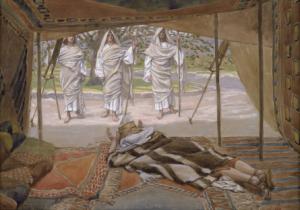
“That be far from thee to do after this manner, to slay the righteous with the wicked: and that the righteous should be as the wicked, that be far from thee: Shall not the Judge of all the earth do right?” (Genesis 18:25)
In verse 25, we have the second profound rhetorical question of Genesis 18: Shall not the Judge of all the earth do right? Last time, the Lord posed the question: Is anything too hard for the Lord? Now, Abraham poses this one. I call them both rhetorical questions, those which are asked only to emphasize, not to gain new information. They are questions that need no answers, for the answers to them are already known and settled. Or are they?
For a great many skeptics of the Bible, this question of the Judge of all the earth doing right is something known and already settled, too. But in their viewpoint, the answer is a resounding No! One of the most common objections to the veracity of the Bible being raised in our generation (and it does really go back much farther) is what has been called the “character assassination” of God. Entire books have been penned by prominent atheistic philosophers and scientists ridiculing what they call the cruel, vindictive, and capricious nature of God. They take issue with the justice of God’s judgments as described in the Bible (particularly the Old Testament) and have even accused God of being immoral in His actions.
But it seems that Abraham put a little more trust in God’s ability to distinguish between right and wrong. Apparently, Abraham, having a very real and intimate knowledge of God, reached a different conclusion than those who prefer to smugly dissect the Word of God and cherry-pick a verse here and there that they personally find distasteful. Maybe Abraham learned a great deal more about the God of the Universe through his personal encounters with Him in the wilderness of Canaan than we are able to ascertain in a musty library 30 to 40 centuries later? At any rate, Abraham was convinced enough of God’s justice that he is emboldened to raise the question of whether or not God will arbitrarily destroy the righteous and the wicked when He judges Sodom and Gomorrah.
“And Abraham drew near, and said, Wilt thou also destroy the righteous with the wicked?” (Genesis 18:23)
It’s worth noting that Abraham drew near before he posed any question about the Lord’s impending actions. Before any of us can hope to make any kind of intercession with God, we must be close to Him. God is simply not going to hear the prayers from a heart that is far from Him, save the prayer that seeks to come closer to Him. Abraham does not question the righteousness and justice of God, but “reminds” Him of it. Abraham is not trying to determine whether or not God will judge the righteous and the wicked, all he really has in mind is knowing whether or not his nephew, Lot, who lives in Sodom is among the righteous that will not perish. Thus he begins his countdown of asking if the Lord shall spare the city for the sake of 50, 45, 40, and so on, righteous people. I believe that he certainly had his doubts about whether or not Lot was really a saved man or not, and this prevented him from just coming right out and asking. As the numbers got lower and lower, I think he became more and more concerned.
“Touching the Almighty, we cannot find him out: he is excellent in power, and in judgment, and in plenty of justice: he will not afflict.” (Job 37:23)
Shall not the Judge of all the earth do right? Abraham knew that God will always do what is right and just. Job and his friends learned this lesson, too. We could probably use this very question as the summarizing phrase for the entire Book of Job, in fact. It might be easy to stand far back and look at God’s actions and decide whether or not we feel that what He has done is right or not. But if we do as Abraham did, if we draw near to God, if we get to know Him, we will see that the Judge of all the earth invariably does what is right.
“The fear of the LORD is clean, enduring for ever: the judgments of the LORD are true and righteous altogether.” (Psalm 19:9)
To Jesus Christ goes all glory. In service to Him,
Loren
[This post was originally published January 18, 2010]
All Scripture quotations in this post are taken from the King James Version (KJV) of the Holy Bible
[If you do not know the Lord Jesus Christ or you are not certain where you are headed when this life ends, I invite you to read the article “Am I Going To Heaven?“]
Advertisements